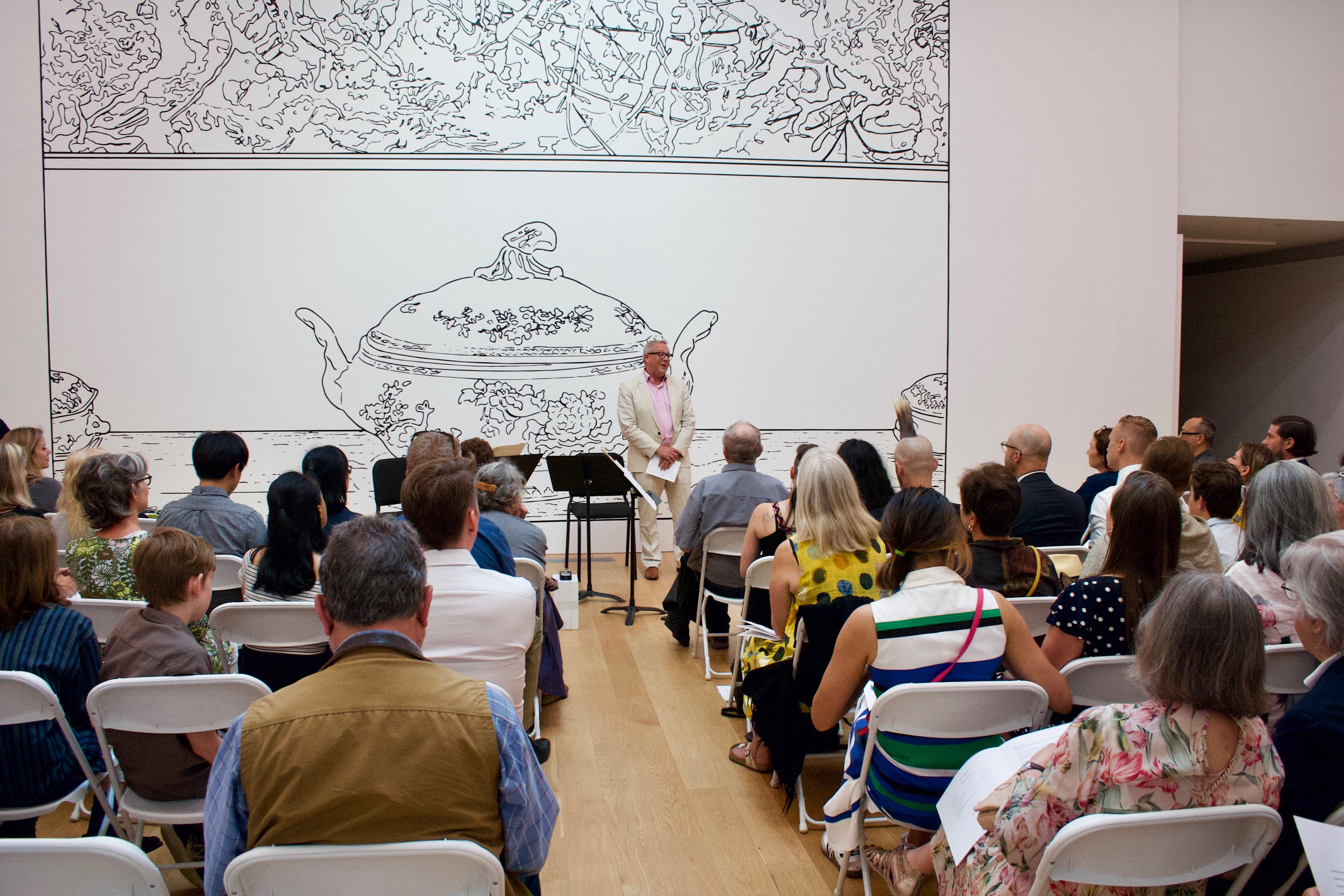Pictured beneath Martin Creed’s installation ‘Everything Is Going To Be Alright‘ are members of the Borealis String Quartet with Dr. Jennifer Butler (3rd L); Rennie Museum Director Wendy Chang (4th L); Jordan Nobles (2nd R) & Sean Bickerton (R) from the CMC
Last Monday evening, the internationally-celebrated Borealis String Quartet premiered eight new five-minute string quartets written by emerging composers ranging in age from 12 to 50. The concert was the result of an 8-week composition seminar on writing for the string quartet — CMC BC’s Jean Coulthard String Quartet Readings — led by Dr. Jennifer Butler. The quartets were inspired by a recent exhibition at the Rennie Museum — Spring 2019: Collected Works.
The Deux Mille Foundation made it possible to offer this unique program free to participants. And Bob Rennie‘s generosity, and the museum’s Director Wendy Chan‘s wonderfully collaborative spirit made it possible to stage these world premieres in the architecturally-stunning Rennie Museum in the lovingly restored Wing Sang Building in Chinatown. The Rennie Museum also sponsored a gorgeous reception after in the gallery’s stunning rooftop sculpture garden. Thanks to the Deux Mille Foundation and Bob Rennie, all proceeds benefited the Canadian Music Centre in BC.
The concert was called 8 X 5 based on the number and length of the quartets. Most of us know what a lucky number 8 is considered in Chinese society. The number five, in Chinese culture, is also considered fortuitous, associated as it is with the Daoist philosophy of Wu Xing, which encompasses Five Elements or cycles, loosely translated as Fire, Earth, Metal, Water, and Wood.
While these are imprecise translations, Wood in the Daoist philosophy is considered emblematic of Spring; Fire of Summer; Metal emblematic of Autumn; and Water of Winter, a period of retreat and stillness. Earth is meant to represent the transitions in between.
[envira-gallery id=”4990″]
Wood is also what the instruments of the quartet are made of. Metal their strings. Fire can symbolize the passion of the performers and the composers. And water can be considered the perspiration that is such a necessary companion to all inspiration. And the Earth, the ground itself the building stands on, traditional territory of the Coast Salish Peoples, developed through Chinese industry and creativity.
We heard all of those things Monday night. The wood. The metal, the fire. The water. Many different cultures and traditions. And hopefully, too, voices of the Earth itself.
Program
Autumn Moon ~ Alvin Leung
Joyful Sorrow ~ Ari Mansell
Placere Ego Quo Ego Vado ~ Katie Purcell
A Personal Universe ~ Gavin Topnik
Surface Fiction ~ Chris Albanese
I Can’t Separate You From The Noise and I don’t want to ~ Shelley Islam
Frames ~ Sarah Westwick
‘Kwela!’ ~ Thomas Beckman
Dr. Jennifer Butler, Composer-Mentor
About Rennie Museum Exhibit Spring 2019: Collected Works
Spring 2019: Collected Works, is a group exhibition encompassing the mediums of photography, painting and film. A portraiture of the collecting spirit, the works featured in this exhibit invite exploration of what collected objects, and the considered and unintentional ways they are displayed, tell us.
These are tales of loss, of magnificent things found, of the transient nature of the lives of those that collect art, of destruction, of love and hate, of the passing nature of wealth and celebrity, of the value and worth of art itself. Featuring four artists — Andrew Grassie, William E. Jones, Louise Lawler and Catherine Opie — the exhibition runs from February 16 to June 15, 2019.
About The Jean Coulthard String Quartet Readings
Named in honour of one of British Columbia’s most beloved legacy composers and teachers, the Jean Coulthard String Quartet Readings allow emerging composers to gain experience writing for string quartet, along with the invaluable opportunity of having their pieces read, workshopped, rehearsed, and performed by a professional string quartet through sessions facilitated by a professional Composer-Mentor.
The program’s unique format is designed for composers to receive feedback from both the Borealis Quartet and the Composer-Mentor, so they may revise and refine their works several times over the course of the twelve-week seminar. Thanks to the generosity of the Deux Mille Foundation for helping to make the the Jean Coulthard String Quartet Readings possible.
About Jean Coulthard (1908 – 2000)
Jean Coulthard was born in Vancouver in 1908 to a pioneering British Columbia doctor, Walter Coulthard, and to Jean Robinson Coulthard, a singer, music teacher, and influential figure in early musical life on the West Coast of Canada.
Coulthard attended public schools in Vancouver, then spent a few experimental months at the new Point Grey campus of the University of British Columbia. But Coulthard and her parents knew she was headed for a thoroughly musical life and career. In the late 1920s she traveled to London for a year of study with Ralph Vaughan Williams at the Royal College of Music.
Although these initial studies proved insufficient to allow her to work as a professional composer, her persistence in composition, combined with travels in North America and Europe, help to
explain her consistent productivity through the years of Depression and War. At various times, she knew and worked with Aaron Copland, Darius Milhaud, Arnold Schoenberg, and Béla Bartók. Then, with her husband in war service, Coulthard chose to complete her formal composition studies in 1944–45 in New York with Bernard Wagenaar, a professor at the Juilliard School.
Jean Coulthard married Donald Adams in 1935. Their daughter, Jane, was born in 1943, and in 1946 the young family returned to Vancouver. Just a year later, Coulthard began a 26-year-long career teaching theory and, later, composition in the Department of Music at the University of British Columbia. But her work at the university was often marginalized by male American and Canadian colleagues. By mid-century Coulthard’s work was often considered out of touch by the new music establishment. A year in France convinced her to write as she pleased.
By her official “retirement” in 1973 Coulthard had written and published a vast and important body of works in all genres to which she added nearly two further decades of enormous productivity. She was becoming internationally well-known and connected, and by the end of the century was recognized as one of the most significant composers of her time. Her music was popular, occasionally with her “serious music” colleagues, sometimes with the public, and sometimes with both. It continues to be performed by learners and by virtuosi, live, in broadcast, and in recording, all to great effect.
Coulthard was a member of the Order of Canada (1978), holder of honorary doctorates from two universities, and decorated many times in competitions between 1948 and her death in 2000. All through her adult life, Coulthard was staunchly of the view that her legacy was in her family; in her compositions; and in her many students, a body of young and highly individualistic Canadian composers who have shaped the national musical arts from the late 1960s onward.
— PROCAN, Canadian League of Composers





